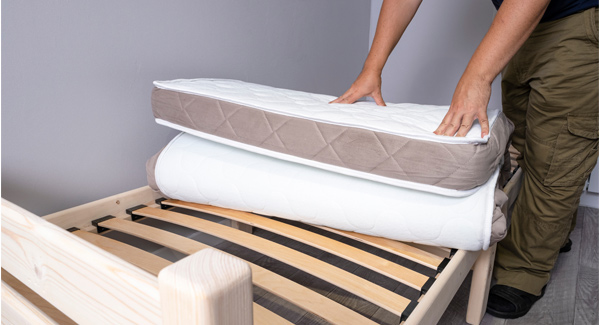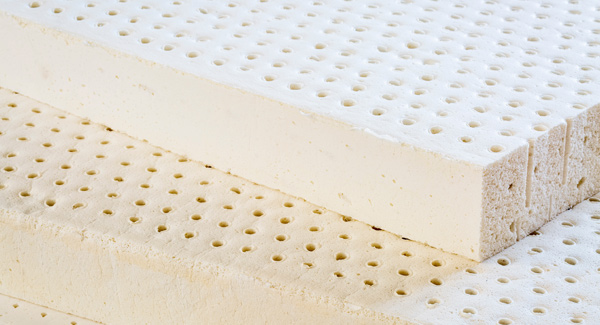Home » Mattress advice » Why Your New Mattress May Cause Back Pain
Why your new mattress may cause back pain
Article navigation
- Tony Brown
A new mattress can have a positive impact on your sleep quality. But when you switch to a new mattress, it may initially feel uncomfortable or even contribute to back pain while your body adjusts to it.
It takes time to adjust to a new mattress
Like a new pair of shoes, your body needs time to adjust to a new mattress. Many of us become accustomed to the feel of an old mattress and may develop poor sleeping posture. So when you transition to a new mattress, it may feel uncomfortable at first or even cause back pain while your body adjusts to it.
It can take at least a month to adjust to a new mattress. It may feel firmer than initially expected but will soften with use. Memory foam mattresses may take longer to adjust to than other mattresses due to the unique material.
You may find that your new mattress feels different to the one you tried in the showroom. Keep in mind that store mattresses are generally more worn-in due to the number of people lying on them.
If your back pain persists, it could be due to changes in your lifestyle. But if you’re waking up feeling sore each morning, it could be a sign that your new mattress fails to provide the comfort and support you need and may not be suitable for you.
Sleeping on a cheaper mattress
Mattress shopping can be confusing, and with so many options to choose from, it can be difficult to recognise a good mattress from a bad one.
As with most things in life, you generally get what you pay for with mattresses. Whilst they may seem similar, there are vast differences in the quality. A cheaper mattress may seem like a bargain, but it is unlikely to provide the support you need.
With cheaper memory foam mattresses, you won’t necessarily know how much memory foam is inside or how deep its layers are.
Similarly, it may be unclear how many springs are in the mattress. A bed may be described as having 1000 pocket springs, but the actual number of springs in the mattress may be far less if the manufacturer includes the springs in the bed base as part of the overall spring count. So, if you buy a new mattress separately, it may not be as supportive as you initially expected.
Some mattresses contain mini springs to provide an additional comfort layer. These springs are not as supportive as full height springs. Many manufacturers include mini springs in the mattress’s specification to exaggerate the overall spring count. This can be misleading when comparing pocket spring mattresses, as you won’t necessarily know whether you’re comparing mini springs with full height springs.
Also, spring counts are usually based on the king size model to allow easier comparison between mattresses, so smaller sizes will have fewer springs.
Many people are deceived by clever marketing when choosing their new mattress. This often results in the mattress failing to perform as expected. Be wary of mattresses that claim to be good for a bad back, such as orthopaedic or posturepedic mattresses. These terms describe firm mattresses and can often make back pain feel worse instead of better.
Incorrect support
It’s not always possible to identify the cause of back pain, but if you’re waking up with aches and pains, it could result from poor sleeping posture.
Sleeping on the wrong mattress can cause or aggravate back pain. Many people assume they need a firm mattress for a bad back, which is not necessarily the case.
If the mattress is too firm, the pressure of the springs can lead to pressure points, resulting in discomfort and increased tossing and turning throughout the night.
However, soft mattresses may also cause problems. If the mattress is too soft, this can cause the body to slouch and put the body in an unnatural sleeping position.
Choosing the correct type of mattress is essential to help avoid back pain. A new mattress should conform to the shape of your body and feel comfortable and supportive.
Your mattress is paired with an unsupportive bed base
The mattress and the bed base should work together and ideally be purchased at the same time. If your new mattress is placed on an existing bed base and you’re waking up with back pain, it could be the foundation causing the problems.
An old unsupportive bed base can also put the body out of natural alignment and cause back pain. You should check the bed base is level and that its surface is free from dips or hollows. Otherwise, the new mattress will quickly take its shape.
If the new mattress is placed on a slatted bed frame, it is important to ensure that the gap between the slats does not exceed the manufacturer’s recommendations to ensure that the mattress does not sag between the gaps.
What can you do if your new mattress is causing back pain?
If you’re unhappy with your new mattress, speak to the store where you purchased it from. A good retailer should understand your situation and should be able to offer some solutions.
The store may be willing to exchange the mattress, especially if they have a good reputation or if you have forged a good relationship with the salesperson. Similarly, some mattresses come with a sleep trial where you may be able to return or exchange the mattress if you’re finding it uncomfortable.
If your mattress is too firm or too soft, using a mattress topper can help make it feel more comfortable. Mattress toppers vary in thickness and firmness and can be made in different materials, such as memory foam, latex, and wool.
You could also try swapping your pillows or using extra pillows to help make your bed feel more comfortable.
Changing your bed base can also slightly change the feel of the mattress. Placing a new mattress on a sprung bed base will provide a slightly softer and bouncier feel. While placing your mattress on a solid bed base or slats will make it feel slightly firmer.
It is important to check that the bed base and mattress are compatible to ensure you are correctly supported.
Final thoughts
It is normal to feel back pain when sleeping on a new mattress. While this can be frustrating, give it time and your new mattress should start to perform as expected.
If your back pain does not improve, it could result from other activities. In this case, speak to a doctor or chiropractor for further advice.
Learn more

About the author
Tony Brown is the founder and creator of The Bed Consultant. His career in the bed industry began in 2002. After graduating from university with a degree in Business Administration, Tony joined one of the largest independent furniture retailers in the UK as a bed consultant. Tony has helped thousands of customers find the perfect mattress.





